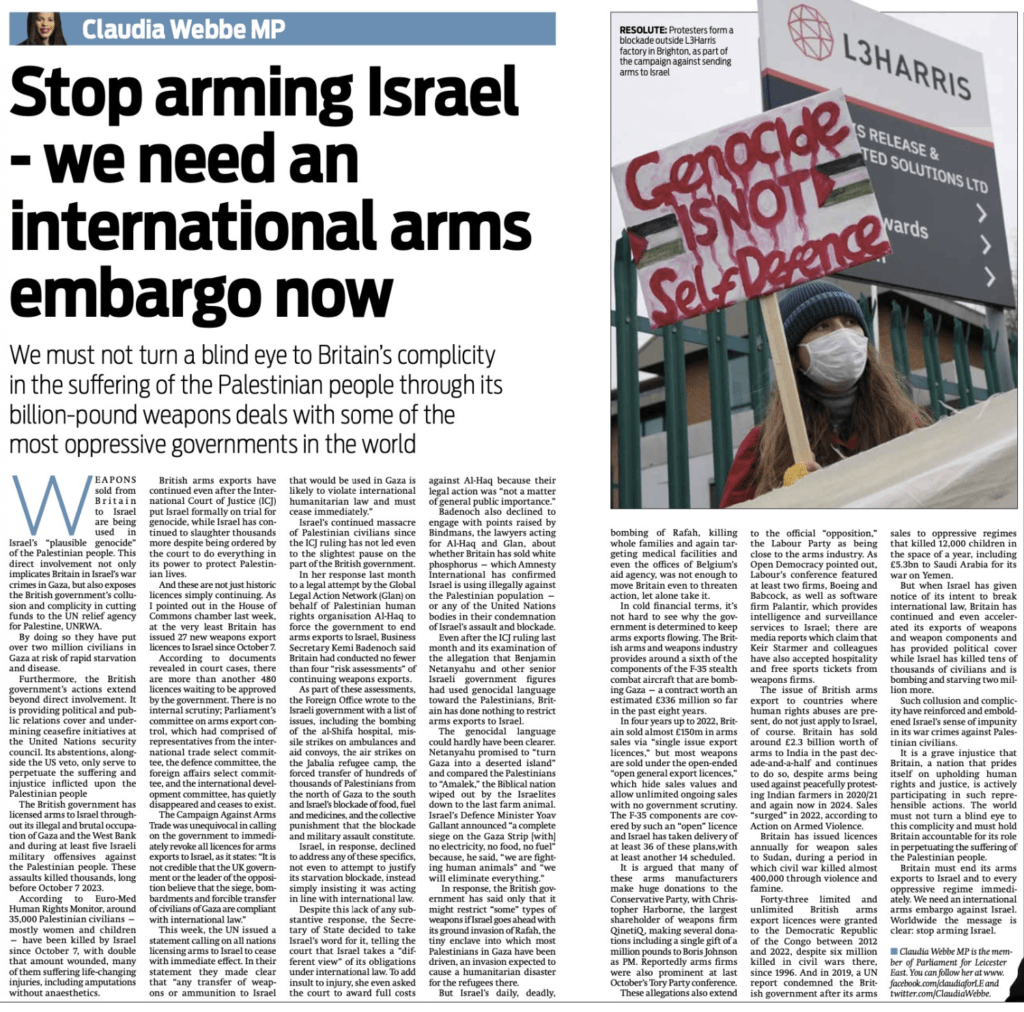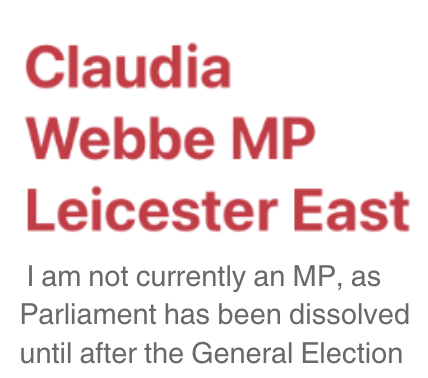
Stop arming Israel – we need an international arms embargo now
By Claudia Webbe MP
We must not turn a blind eye to Britain’s complicity in the suffering of the Palestinian people through its billion-pound weapons deals with some of the most oppressive governments in the world, writes CLAUDIA WEBBE MP
WEAPONS sold from Britain to Israel are being used in Israel’s “plausible genocide” of the Palestinian people. This direct involvement not only implicates Britain in Israel’s war crimes in Gaza, but also exposes the British government’s collusion and complicity in cutting funds to the UN relief agency for Palestine, UNRWA.
By doing so they have put over two million civilians in Gaza at risk of rapid starvation and disease.
Furthermore, the British government’s actions extend beyond direct involvement. It is providing political and public relations cover and undermining ceasefire initiatives at the United Nations security council. Its abstentions, alongside the US veto, only serve to perpetuate the suffering and injustice inflicted upon the Palestinian people
The British government has licensed arms to Israel throughout its illegal and brutal occupation of Gaza and the West Bank and during at least five Israeli military offensives against the Palestinian people. These assaults killed thousands, long before October 7 2023.
According to Euro-Med Human Rights Monitor, around 35,000 Palestinian civilians — mostly women and children — have been killed by Israel since October 7, with double that amount wounded, many of them suffering life-changing injuries, including amputations without anaesthetics.
British arms exports have continued even after the International Court of Justice (ICJ) put Israel formally on trial for genocide, while Israel has continued to slaughter thousands more despite being ordered by the court to do everything in its power to protect Palestinian lives.
And these are not just historic licences simply continuing. As I pointed out in the House of Commons chamber last week, at the very least Britain has issued 27 new weapons export licences to Israel since October 7.
According to documents revealed in court cases, there are more than another 480 licences waiting to be approved by the government. There is no internal scrutiny; Parliament’s committee on arms export control, which had comprised of representatives from the international trade select committee, the defence committee, the foreign affairs select committee, and the international development committee, has quietly disappeared and ceases to exist.
The Campaign Against Arms Trade was unequivocal in calling on the government to immediately revoke all licences for arms exports to Israel, as it states: “It is not credible that the UK government or the leader of the opposition believe that the siege, bombardments and forcible transfer of civilians of Gaza are compliant with international law.”
This week, the UN issued a statement calling on all nations licensing arms to Israel to cease with immediate effect. In their statement they made clear that “any transfer of weapons or ammunition to Israel that would be used in Gaza is likely to violate international humanitarian law and must cease immediately.”
Israel’s continued massacre of Palestinian civilians since the ICJ ruling has not led even to the slightest pause on the part of the British government.
In her response last month to a legal attempt by the Global Legal Action Network (Glan) on behalf of Palestinian human rights organisation Al-Haq to force the government to end arms exports to Israel, Business Secretary Kemi Badenoch said Britain had conducted no fewer than four “risk assessments” of continuing weapons exports.
As part of these assessments, the Foreign Office wrote to the Israeli government with a list of issues, including the bombing of the al-Shifa hospital, missile strikes on ambulances and aid convoys, the air strikes on the Jabalia refugee camp, the forced transfer of hundreds of thousands of Palestinians from the north of Gaza to the south and Israel’s blockade of food, fuel and medicines, and the collective punishment that the blockade and military assault constitute.
Israel, in response, declined to address any of these specifics, not even to attempt to justify its starvation blockade, instead simply insisting it was acting in line with international law.
Despite this lack of any substantive response, the Secretary of State decided to take Israel’s word for it, telling the court that Israel takes a “different view” of its obligations under international law. To add insult to injury, she even asked the court to award full costs against Al-Haq because their legal action was “not a matter of general public importance.”
Badenoch also declined to engage with points raised by Bindmans, the lawyers acting for Al-Haq and Glan, about whether Britain has sold white phosphorus — which Amnesty International has confirmed Israel is using illegally against the Palestinian population — or any of the United Nations bodies in their condemnation of Israel’s assault and blockade.
Even after the ICJ ruling last month and its examination of the allegation that Benjamin Netanyahu and other senior Israeli government figures had used genocidal language toward the Palestinians, Britain has done nothing to restrict arms exports to Israel.
The genocidal language could hardly have been clearer. Netanyahu promised to “turn Gaza into a deserted island” and compared the Palestinians to “Amalek,” the Biblical nation wiped out by the Israelites down to the last farm animal. Israel’s Defence Minister Yoav Gallant announced “a complete siege on the Gaza Strip [with] no electricity, no food, no fuel” because, he said, “we are fighting human animals” and “we will eliminate everything.”
In response, the British government has said only that it might restrict “some” types of weapons if Israel goes ahead with its ground invasion of Rafah, the tiny enclave into which most Palestinians in Gaza have been driven, an invasion expected to cause a humanitarian disaster for the refugees there.
But Israel’s daily, deadly, bombing of Rafah, killing whole families and again targeting medical facilities and even the offices of Belgium’s aid agency, was not enough to move Britain even to threaten action, let alone take it.
In cold financial terms, it’s not hard to see why the government is determined to keep arms exports flowing. The British arms and weapons industry provides around a sixth of the components of the F-35 stealth combat aircraft that are bombing Gaza — a contract worth an estimated £336 million so far in the past eight years.
In four years up to 2022, Britain sold almost £150m in arms sales via “single issue export licences,” but most weapons are sold under the open-ended “open general export licences,” which hide sales values and allow unlimited ongoing sales with no government scrutiny. The F-35 components are covered by such an “open” licence and Israel has taken delivery of at least 36 of these plans, with at least another 14 scheduled.
It is argued that many of these arms manufacturers make huge donations to the Conservative Party, with Christopher Harborne, the largest shareholder of weapons firm QinetiQ, making several donations including a single gift of a million pounds to Boris Johnson as PM. Reportedly arms firms were also prominent at last October’s Tory Party conference.
These allegations also extend to the official “opposition,” the Labour Party as being close to the arms industry. As Open Democracy pointed out, Labour’s conference featured at least two firms, Boeing and Babcock, as well as software firm Palantir, which provides intelligence and surveillance services to Israel; there are media reports which claim that Keir Starmer and colleagues have also accepted hospitality and free sports tickets from weapons firms.
The issue of British arms export to countries where human rights abuses are present, do not just apply to Israel, of course. Britain has sold around £2.3 billion worth of arms to India in the past decade-and-a-half and continues to do so, despite arms being used against peacefully protesting Indian farmers in 2020/21 and again now in 2024. Sales “surged” in 2022, according to Action on Armed Violence.
Britain has issued licences annually for weapon sales to Sudan, during a period in which civil war killed almost 400,000 through violence and famine. Forty-three limited and unlimited British arms export licences were granted to the Democratic Republic of the Congo between 2012 and 2022, despite six million killed in civil wars there, since 1996. And in 2019, a UN report condemned the British government after its arms sales to oppressive regimes that killed 12,000 children in the space of a year, including £5.3bn to Saudi Arabia for its war on Yemen.
But when Israel has given notice of its intent to break international law, Britain has continued and even accelerated its exports of weapons and weapon components and has provided political cover while Israel has killed tens of thousands of civilians and is bombing and starving two million more.
Such collusion and complicity have reinforced and emboldened Israel’s sense of impunity in its war crimes against Palestinian civilians.
It is a grave injustice that Britain, a nation that prides itself on upholding human rights and justice, is actively participating in such reprehensible actions. The world must not turn a blind eye to this complicity and must hold Britain accountable for its role in perpetuating the suffering of the Palestinian people.
Britain must end its arms exports to Israel and to every oppressive regime immediately. We need an international arms embargo against Israel. Worldwide the message is clear: stop arming Israel.
Claudia Webbe MP is the member of Parliament for Leicester East. You can follow her at www.facebook.com/claudiaforLE and twitter.com/ClaudiaWebbe


